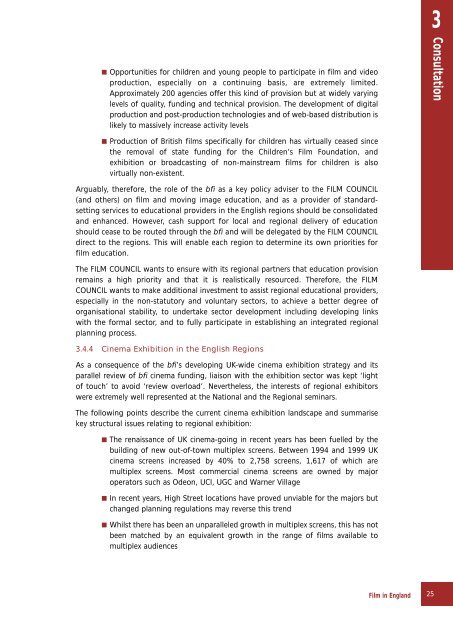FILM IN ENGLAND - UK Film Council - British Film Institute
FILM IN ENGLAND - UK Film Council - British Film Institute
FILM IN ENGLAND - UK Film Council - British Film Institute
You also want an ePaper? Increase the reach of your titles
YUMPU automatically turns print PDFs into web optimized ePapers that Google loves.
■ Opportunities for children and young people to participate in film and video<br />
production, especially on a continuing basis, are extremely limited.<br />
Approximately 200 agencies offer this kind of provision but at widely varying<br />
levels of quality, funding and technical provision. The development of digital<br />
production and post-production technologies and of web-based distribution is<br />
likely to massively increase activity levels<br />
■ Production of <strong>British</strong> films specifically for children has virtually ceased since<br />
the removal of state funding for the Children’s <strong>Film</strong> Foundation, and<br />
exhibition or broadcasting of non-mainstream films for children is also<br />
virtually non-existent.<br />
Arguably, therefore, the role of the bfi as a key policy adviser to the <strong>FILM</strong> COUNCIL<br />
(and others) on film and moving image education, and as a provider of standardsetting<br />
services to educational providers in the English regions should be consolidated<br />
and enhanced. However, cash support for local and regional delivery of education<br />
should cease to be routed through the bfi and will be delegated by the <strong>FILM</strong> COUNCIL<br />
direct to the regions. This will enable each region to determine its own priorities for<br />
film education.<br />
The <strong>FILM</strong> COUNCIL wants to ensure with its regional partners that education provision<br />
remains a high priority and that it is realistically resourced. Therefore, the <strong>FILM</strong><br />
COUNCIL wants to make additional investment to assist regional educational providers,<br />
especially in the non-statutory and voluntary sectors, to achieve a better degree of<br />
organisational stability, to undertake sector development including developing links<br />
with the formal sector, and to fully participate in establishing an integrated regional<br />
planning process.<br />
3.4.4 Cinema Exhibition in the English Regions<br />
As a consequence of the bfi’s developing <strong>UK</strong>-wide cinema exhibition strategy and its<br />
parallel review of bfi cinema funding, liaison with the exhibition sector was kept ‘light<br />
of touch’ to avoid ‘review overload’. Nevertheless, the interests of regional exhibitors<br />
were extremely well represented at the National and the Regional seminars.<br />
The following points describe the current cinema exhibition landscape and summarise<br />
key structural issues relating to regional exhibition:<br />
■ The renaissance of <strong>UK</strong> cinema-going in recent years has been fuelled by the<br />
building of new out-of-town multiplex screens. Between 1994 and 1999 <strong>UK</strong><br />
cinema screens increased by 40% to 2,758 screens, 1,617 of which are<br />
multiplex screens. Most commercial cinema screens are owned by major<br />
operators such as Odeon, UCI, UGC and Warner Village<br />
■ In recent years, High Street locations have proved unviable for the majors but<br />
changed planning regulations may reverse this trend<br />
■ Whilst there has been an unparalleled growth in multiplex screens, this has not<br />
been matched by an equivalent growth in the range of films available to<br />
multiplex audiences<br />
<strong>Film</strong> in England<br />
25<br />
3<br />
Consultation

















